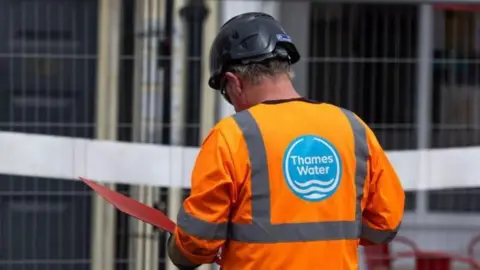Thames Water 'extremely stressed', warns boss
 Getty Images
Getty ImagesThames Water is "extremely stressed" and will take "at least a decade to turn around", its boss has said, as the struggling company posted huge annual losses.
Thames reported a loss of £1.65bn for the year to March, while its debt pile climbed to £16.8bn.
The UK's largest water and waste company claimed "significant rainfall and high groundwater levels" led to pollution incidents increasing by more than a third, but said it had tried to address "many of the underlying causes of our poor performance".
The results came as Thames bosses were quizzed by MPs. Fears the company could collapse first emerged two years ago and its future is still uncertain.
Thames serves about a quarter of the UK's population, mostly across London and parts of southern England, and employs 8,000 people.
Chris Weston, chief executive of Thames Water, said the company had made "good progress" on its performance, "despite the ongoing challenging financial situation".
"The company is extremely stressed and operating in very difficult circumstances," he later told MPs on the Environment Committee.
"To turn around and transform this company is going to take between five and 10 years, maybe a bit more."
Last month, Thames suffered a major blow in its attempt to secure its future when US private equity firm KKR pulled out of a £4bn rescue deal.
The setback has increased the possibility that the company could collapse into a government-supervised administration.
Thames has continued to face heavy criticism over its performance in recent years, following a series of sewage discharges and leaks.
In May, it was handed a £122.7m fine, the biggest ever issued by the water industry regulator Ofwat, for breaching rules on sewage spills and shareholder payouts.
The watchdog has confirmed the fines will be paid by the company and its investors, and not by customers who were hit with water bill increases in April.
Water bills for households in England and Wales have risen by £10 per month on average, although costs vary depending on suppliers - Thames customer bills have gone up from £488 to £639 a year.
Thames has paused the bonuses of some senior executives that could have led to them getting £1m on top of their annual salaries.
The Ofwat fine was a factor in Thames' heavy losses, but they were mostly caused by the writing off of a £1.27bn intercompany loan deemed to be no longer recoverable. It also spent £151m on restructuring costs.
'We haven't delivered enough'
Thames said the number of pollution incidents, which include sewage discharges increased to 470 from 350 in the last calendar year. It also said the number of "serious" pollution incidents jumped from 14 in 2023 to 34 in 2024.
The company said its performance had been "impacted by the condition of our assets and their inability to mitigate the overloading of our sewers, which was caused by wetter-than-average weather in the year and ongoing high groundwater levels".
It admitted in its annual report that "historically, we haven't delivered enough of our capital investment plans for improving resilience at our treatment works".
Mr Weston said "prolonged wet weather meant further rain had nowhere to go other than to inundate our ageing and fragile sewer network".
"Reducing pollutions and discharges is something we're really focused on, and we plan to invest record amounts in our waste network during the next five years," he added.
Critics have repeatedly made the argument that Thames' owners took billions of pounds out of the company in loans and dividends over decades instead of modernising pipes and treatment works.
Mr Weston has previously called on the regulator to be lenient on fines, arguing Thames' ability to secure investment and survive depended on it.
Sir Adrian Montague, chairman of Thames Water, appearing alongside Mr Weston on Tuesday, apologised to MPs after being recalled to a hearing amid concerns over transparency at the water giant.
Asked about Thames' situation following KKR's decision not to invest in the firm, Sir Adrian told the Environment, Food and Rural Affairs Committee, that the company was in "reasonable shape".
"The creditors are still advancing. We believe that the bid that's coming through from the creditors is very strong technically. They're exploring that with Ofwat."
A letter to the committee from KKR said the private equity firm decided not to go ahead with a deal as it did not think it would be able to "manage and meet the understandable expectations on the timing of improvements".
The dire state of Thames' finances emerged in June 2023, but the company managed to secure a £3bn rescue loan earlier this year to stave off collapse.
Mr Weston said Thames recognised that its current gearing, which indicates how much a company depends on debt to fund its operations, was "too high".
"To address this, we are progressing with our senior creditors' plan to recapitalise the business which will see us return to a more stable financial foundation," he added.
Regardless of what happens to Thames or who owns the company, its water services will continue as normal.
On Monday, Thames became the latest supplier to announce a hosepipe ban, which will begin next Tuesday for customers in Oxfordshire, Gloucestershire, most of Wiltshire and some parts of Berkshire.
Additional reporting by Oliver Smith, business reporter
